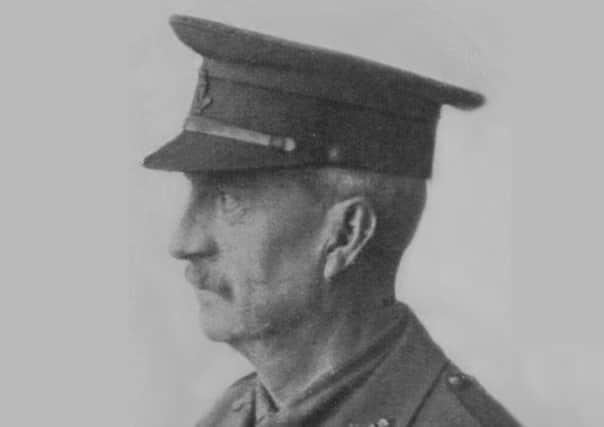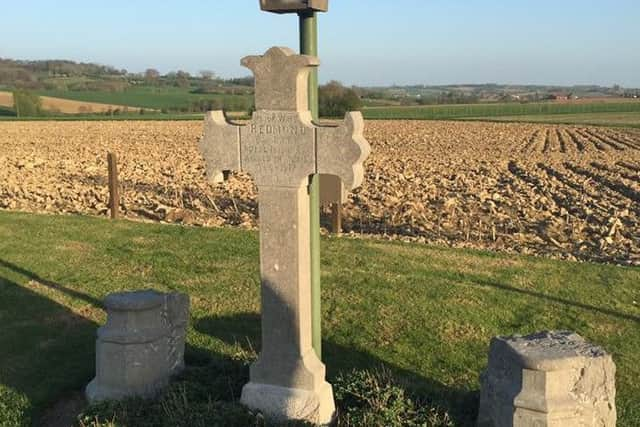Battle of Messines: Nationalist MP died during carnage as an old grey-haired man


William Hoey Kearney Redmond was born on April 13, 1861, in Liverpool into an Irish Roman Catholic gentry family that had been associated with Co Wexford for many centuries.
He was the second son of William Archer Redmond, the Home Rule MP for Wexford (1872–80), and younger brother of John Redmond, the future leader of the Irish Parliamentary Party. He had two sisters.
Advertisement
Hide AdAdvertisement
Hide AdHis mother, Mary (née Hoey), was a member of a Protestant unionist family from County Wicklow.


Although she had converted to Roman Catholicism on her marriage, she did not cease to be a unionist, albeit a southern Irish unionist.
He was educated at Carlow College (1871–72) and Clongowes Wood (1873–76).
According to The Clongowian, Willie “was a light-hearted, good-natured, popular boy, not specially distinguished intellectually”.
Advertisement
Hide AdAdvertisement
Hide AdIt added he was “overshadowed by his more brilliant brother (John)”.


He served briefly as a merchant sailor, before becoming in December 1879 a second lieutenant in the Wexford militia battalion of the Royal Irish Regiment.
He was promoted to lieutenant in October 1880 and toyed with a career in the army but his life took a new direction on becoming involved in nationalist politics and the Land League.
In February 1882 he was arrested for possession of seditious pamphlets, and served three months in Kilmainham (where he spent his 21st birthday). His cellmate was Charles Stewart Parnell.
Advertisement
Hide AdAdvertisement
Hide AdIn July 1883,Willie Redmond was elected MP for Wexford borough, and in 1885 he was elected MP for North Fermanagh.
In the general election of that year his Conservative opponent was J. C. Bloomfield, a minor Fermanagh landowner and Belleek Pottery founder.
Redmond defeated Bloomfield by quite a significant margin in a constituency which the Conservative might have reasonably expected to win.
The Fermanagh Tories attributed their defeat to poor organisation, but the Impartial Reporter suggested that some Protestants had abstained on account of anti-landlord sentiment.
Advertisement
Hide AdAdvertisement
Hide AdBloomfield’s agent had predicted before polling day: “If the Protestants can be got to vote I think we should still win, but between ourselves they are excessively apathetic and anything but favourable to Bloomfield or anyone connected with the landlords.”
In the 1886 general election, the Conservative candidate W. H. Archdale managed to improve the Conservative share of the vote – probably via better organisation and perhaps a decline in hostility to landlordism among Protestant voters – but Redmond still won by a decent margin.
Unionists did not manage to win North Fermanagh until the general election of 1892.
Throughout his life Redmond was to invest his period as MP for North Fermanagh with greater significance than the facts warranted.
Advertisement
Hide AdAdvertisement
Hide AdHe genuinely believed he was capable of reconciling Ulster Protestants to Home Rule, but in truth his actual achievement was rather more modest.
He polled the full Roman Catholic vote and detached a modest proportion of Protestant voters from the Conservative candidate through harnessing anti-landlord sentiment in both 1885 and 1886.
In truth, he had little appreciation of the intensity of Ulster unionist hostility towards Home Rule but in this he was not alone.
After 1892 until his death he represented East Clare, far from Ulster and its concerns.
Advertisement
Hide AdAdvertisement
Hide AdBoth Willie and John Redmond were very Empire-minded. In the 1880s during a tour of Australia to raise funds for the Home Rule Party, he met his future wife Eleanor Mary Dalton – daughter of John Dalton, a prominent Irish-Australian.
They married on February 24, 1886, had one son who died in 1891 at the age of five.
John Redmond married Johanna Dalton, another member of the family.
Despite his Empire-mindedness, Willie aligned himself with “advanced nationalists” (such as Arthur Griffith, Maud Gonne, and James Connolly) in opposition to Irish participation in the Second Boer War and became treasurer of the Irish Transvaal Committee.
Advertisement
Hide AdAdvertisement
Hide AdYet paradoxically, he enthusiastically supported his brother’s backing for Irish participation in the Great War.
In November 1914 he made a famous recruiting speech in Cork: “I do not say to you go, but grey-haired and old as I am, I say come, come with me to the war. If Germany wins we are all endangered.”
His view was: “If not too old to fight, at least will not sit comfortably in an armchair and read what other men are doing and suffering.”
He was commissioned as a temporary captain on February 22, 1915, in the 6th Royal Irish Regiment.
Advertisement
Hide AdAdvertisement
Hide AdAt 54 he was rather old for war service, but his enlistment was facilitated by Sir Lawrence Parsons, the commanding officer of the 16th (Irish) Division.
He proved to be popular and enthusiastic soldier, was mentioned in dispatches by Douglas Haig, and was awarded the Légion d’honneur.
He made his most famous speech in House of Commons while home on leave in March 1917, in which he pleaded with Parliament to grant Home Rule and for reconciliation between orange and green.
He concluded: “In the name of God, we here who are about to die, perhaps, ask you to do that which largely induced us to leave our homes; to do that which our mothers and fathers taught us to long for; to do that which is all we desire; make our country happy and contented, and enable us, when we meet the Canadians and the Australians and the New Zealanders side by side in the common cause and the common field, to say to them: ‘Our country, just as yours, has self-government within the Empire.’”
Advertisement
Hide AdAdvertisement
Hide AdOn June 4 1917, three days before his death in the Battle of Messines, at a dinner organised by officers of 7th Leinsters Redmond made a speech in which he “prayed for the consumption of peace between north and south”.
On June 7, at approximately 3:30 am, Redmond was hit in the thigh by a shrapnel splinter, and then seconds later in the hand. Believing Redmond to be only lightly wounded, his men moved on without him.
Redmond was found by Private John Meeke of Benvarden, Ballymoney, serving with 11th Royal Inniskilling Fusiliers, who tried to carry him back on his shoulder – but Meeke in turn was wounded.
Together they awaited the arrival of the Ulster Division stretcher bearers who brought Redmond and Meeke to the Ulster Division’s Field Ambulance where Redmond died that afternoon.
Advertisement
Hide AdAdvertisement
Hide AdJohn Redmond, an Anglican chaplain (no relation), comforted the dying Willie Redmond.
He died almost certainly from shock because the medical officer who attended him noted that nothing vital had been touched by the shrapnel, and that a younger man would have survived.
However at the age of 56 Redmond was too weak.
The election of Eamon de Valera, the senior surviving commandant of the Easter rebellion of 1916, as the Sinn Fein candidate in the subsequent East Clare by-election provides striking evidence of how dramatic the change in political sentiment in nationalist Ireland was in the course of a little over a year.